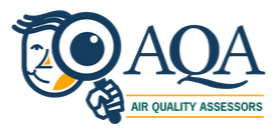company history
Air Quality Assessors of Florida (AQA), is a statewide indoor air quality testing and consultation service provider. Founded in 2010, with over 18 years of mold and moisture mapping, our roots started in a Kidwell family business in Small Town, Florida.
After gaining experience in pest control, landscaping, termite and WDO inspections, AQA added accreditation in mold and moisture assessment.
We identified a need for licensed and professional mold assessment throughout central Florida. This lead to a growth in company expertise and added goals of providing reliable, licensed mold assessments for our customers throughout the state of Florida.
The growth of our company resulted in establishing field offices and adding staff to cover the entire state of Florida. This also started branching into professional training/accreditation and industry advocacy by creating NETI.
AQA boasts an A+ rating with the Better Business Bureau!
Indoor environmental professionals
A remediator’s relationship with an IEP (Indoor Environmental Professional) can sometimes be quite complex. This depends on why, when and by whom the IEP was hired. If there are complexities, complications or conflicts, a remediator may need to request additional input or guidance from an IEP. (See Chapter 9, Limitations, Complexities, Complications and Conflicts). You can find more information on the relationship between IEP’s and companies like AQA.
independence
It is preferable that the IEP be an unbiased resource. An IEP engaged to perform pre-remediation assessment or post-remediation verification should be independent of the remediator. In some jurisdictions, the law may require that the inspection and assessment function be performed by an individual or entity independent of the remediator.
confidentiality
A company owes a duty to its client, which can include confidentiality. Where an IEP is retained by someone other than the remediator, there may be a limit to the information that the IEP can provide to the remediator. Ideally, an IEP will be authorized by the client to share all information with all parties. The EPA’s Mold Remediation in Schools and Commercial Buildings, for example, encourages communication with occupants to help alleviate concerns and suspicions. However, in cases involving litigation, it may be difficult to share or obtain information.
reliance
Mold remediators often rely on an IEP to determine the scope of work and other essential tasks. However, reliance on the training, experience, reputation and credentials of an IEP might not absolve the remediator of legal risk or other responsibilities.
overlap
There may be circumstances when a remediator’s normal activities overlap or conflict with those of an IEP. In those cases, a remediator can reach the point where a decision is necessary to continue an inspection or to transfer the responsibility for further inspection and preliminary determination to an IEP. Factors that influence the decision of whether and when to involve an IEP are addressed in Chapter 8, Inspection and Preliminary Determination, the Preface, and Sections 9 and 15 of this Standard.
Please refer to the table linked below that helps clarify which tasks may be performed by remediators and which ones may be performed by an IEP or others.
